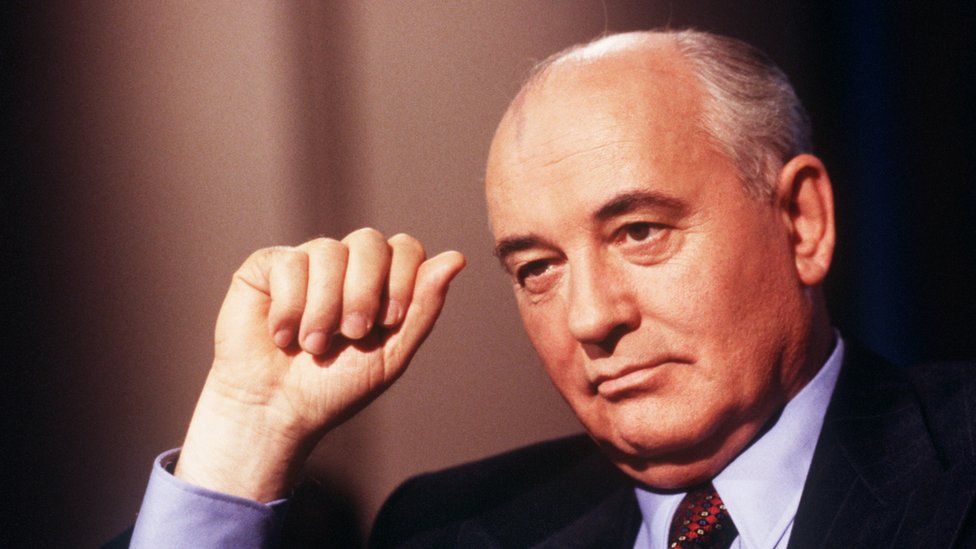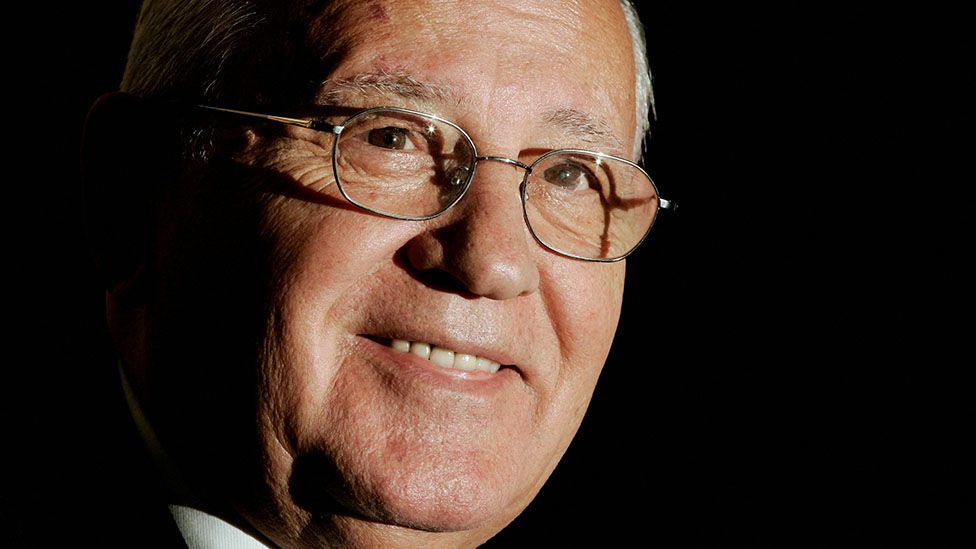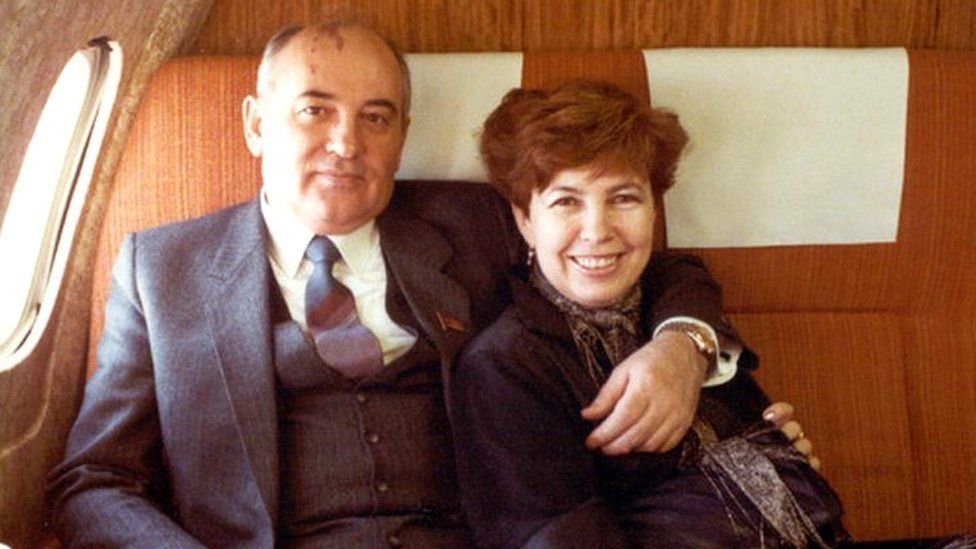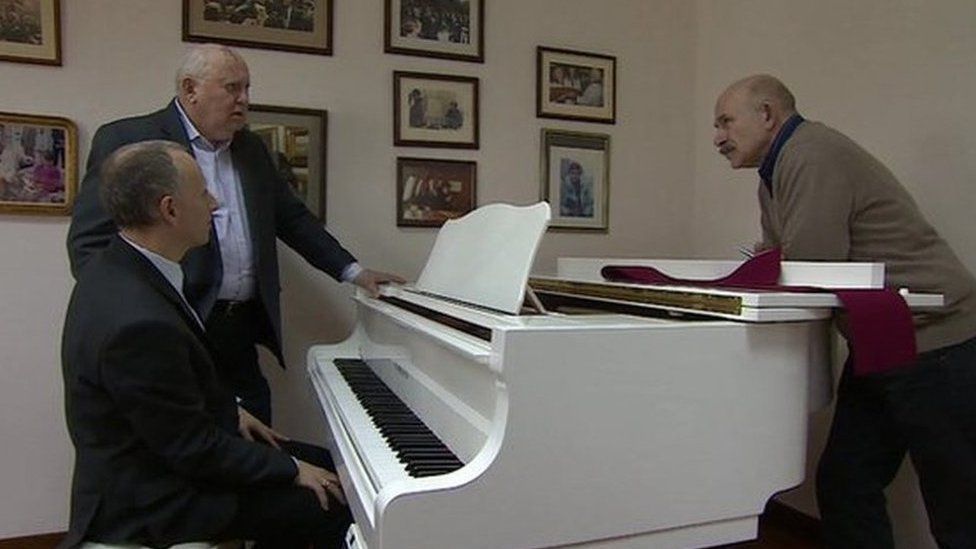Mikhail Gorbachev - the last Soviet leader, who died on Tuesday - had a "huge impact on the course of history", Russia's President Vladimir Putin says.
By Merlyn Thomas
BBC News https://www.bbc.com/news/world-europe-62735271
Mikhail Gorbachev - the last Soviet leader, who died on Tuesday - had a "huge impact on the course of history", Russia's President Vladimir Putin says.
He had understood reforms were necessary, Mr Putin said - while the head of the UN, António Guterres, hailed a "tireless advocate for peace".
Mr Putin's spokesman, however, said Mr Gorbachev had been wrong to believe in "eternal romance" with the West.
Mr Gorbachev took power in 1985, before the Soviet Union collapsed by 1991.
He introduced reforms, but was unable to prevent the slow collapse of the union - and many Russians blamed him for the years of turmoil that ensued.
In his message, President Putin said: "He deeply understood that reforms were necessary, he strove to offer his own solutions to urgent problems."
Mr Putin and Mr Gorbachev had a strained relationship - their last meeting reportedly in 2006.
Most recently, Mr Gorbachev was said to have been unhappy with Mr Putin's decision to invade Ukraine, even though he had supported the annexation of Crimea in 2014.
The Russian leader's spokesman, Dmitry Peskov, said Mr Gorbachev had "sincerely wanted to believe that the Cold War would end, and that it would usher in a period of eternal romance between a new Soviet Union and the world, the West. This romanticism turned out to be wrong".
Mr Peskov then berated Western countries that have opposed the invasion of Ukraine, imposed crippling sanctions on Russia, and provided weapons to Kyiv.
In his tribute, UK Prime Minister Boris Johnson said he admired Mr Gorbachev's courage and integrity, adding: "In a time of Putin's aggression in Ukraine, his tireless commitment to opening up Soviet society remains an example to us all."
US President Joe Biden called him a "rare leader", while UN Secretary General António Guterres said: "The world has lost a towering global leader, committed multilateralist, and tireless advocate for peace."
- OBITUARY: Soviet leader who helped end Cold War
- EX-SOVIET UNION: Little love in Russia's old empire
- STEVE ROSENBERG: Remembering a warm-hearted man
- IN PICTURES: The life of Mikhail Gorbachev
- WATCH: Duetting with Gorbachev
The hospital in Moscow where Mr Gorbachev died said he had been suffering from a long and serious illness.
In recent years, his health had been in decline and he had been in and out of hospital. In June, international media reported that he was suffering from a kidney ailment, though his cause of death has not been announced.
He will be buried in Moscow's Novodevichy cemetery, the resting place of many prominent Russians. It is not clear whether he will receive a state funeral.
Mr Gorbachev became general secretary of the Soviet Communist Party, and de facto leader of the country, in 1985.
At the time, he was 54 - the youngest member of the ruling council known as the Politburo, and was seen as a breath of fresh air after several ageing leaders. His predecessor, Konstantin Chernenko, had died aged 73 after just over a year in office.
Few leaders have had such a profound effect on the global order, but Mr Gorbachev did not come to power seeking to end the Soviet grip over eastern Europe. Rather, he hoped to revitalise its society.
The Soviet economy had been struggling for years to keep up with the US and his policy of perestroika sought to introduce some market-like reforms to the state run system.
Internationally he reached arms control deals with the US, refused to intervene when eastern European nations rose up against their Communist rulers, and ended the bloody Soviet war in Afghanistan that had raged since 1979.
Meanwhile, his policy of glasnost, or openness, allowed people to criticise the government in a way which had been previously unthinkable.
But it also unleashed nationalist sentiments in many parts of the Soviet Union which eventually undermined its stability and hastened its collapse.
In 1991, after a shambolically organised coup by communist hardliners failed, Mr Gorbachev agreed to dissolve the Soviet Union and left office.
Ronald Reagan and Mikhail Gorbachev signing the Intermediate-Range Nuclear Forces Treaty in 1987
He is seen in the West as an architect of reform who created the conditions for the end of the Cold War in 1991 - a time of deep tensions between the Soviet Union and Western nations.
He was awarded the Nobel Peace Prize in 1990 "for the leading role he played in the radical changes in East-West relations".
But in the new Russia that emerged after 1991, he was on the fringes of politics, focusing on educational and humanitarian projects.
Mr Gorbachev made one ill-fated attempt to return to political life in 1996, receiving just 0.5% of the vote in presidential elections.
Henry Kissinger, who served as US Secretary of State under President Richard Nixon, told the BBC's Newsnight programme that Mr Gorbachev would be "remembered in history as a man who started historic transformations that were to the benefit of mankind and to the Russian people".
Watch: Henry Kissinger pays tribute to Mikahil Gorbachev
Vladimir Rogov, a Russian-appointed official in occupied Ukraine, said Mr Gorbachev had "deliberately led the [Soviet] Union to its demise" and called him a traitor.
What ordinary Russians thought of him was perhaps encapsulated in a Pizza Hut advertisement - designed for the US market - that he took part in 1997.
In the ad, diners debate the chaos unleashed - or the opportunities created - by the end of the union, before toasting him.



















